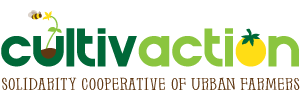


This course is for anyone who is interested in learning about gardening, urban farming, and urban permaculture. Students in this course will gain knowledge on how to produce food in their own yards, balconies, community/collective gardens, and other urban spaces. For those who don’t have access to an urban space for practice, we will offer hands-on opportunities on one of Coop CultivAction’s farms to get hands on experience.
The CultivAction Urban Agriculture course will equip participants with the knowledge, skills, practical experience, and critical understanding necessary to enact meaningful transformations within their local food system.

COMMUNITY REGISTRATION
QUESTIONS?
FOLLOW US!
COST
Community Rate: $875.00
Take advantage of our special subsidized rate and pay just $50 for registration!
ACCESSIBILITY
We prioritize community accessibility while ensuring fair compensation for our workers. Those unable to pay the full fee have two options:

Option 1
Located at Concordia University, Loyola Campus. The Loyola Farm is behind the TB building – 7079 Rue de Terrebonne, Montreal, Quebec H4B 1E1.
This Course runs biweekly on Tuesdays evenings from 5:30 p.m. to 8:30 p.m., from May 14 to October 15.

This urban agriculture course is offered biweekly for the entire growing season. The course consists of 12 engaging classes beginning in May finishing in October. The course is for adults of all ages who want to learn how to grow nutritious food in an urban setting. Whether you are looking to transform your property into an edible garden, learn how to maintain a community garden, or you want to improve your existing gardening skills, this course will provide you with theoretical knowledge and practical skills to support your journey towards becoming more self-sufficient.

Erik Chevrier has been a driver of sustainable food systems at Concordia University as a part-time professor, activist and student.
As a part-time professor, Erik has taught Food and Culture and Food and Sustainability, and provided his students with opportunities for hands-on learning and critical-participatory-action-research. He enables his students to learn by doing and empowers them to become community leaders, urban farmers, and sustainability activists.
With a strong interest in the political economy of ethical food systems, Erik has meticulously chronicled Concordia’s student-run food cooperatives through his Ph.D in Humanities.
His community involvement in sustainability at Concordia includes the Concordia Food Coalition, Divest Concordia, the Hive Café Co-op, and more. He has also founded a number of organizations, research projects and educational programs, including the non-profit solidarity urban farming cooperative CultivAction.
Mohammed Al-Duais will co-teach this course with Erik and nico schutte will lead the mushroom class.

The Loyola Farm is located at the back of Concordia University, Loyola Campus – TB building. 7079 Rue de Terrebonne, Montreal, Quebec H4B 1E1.

OPTION 2
Located in the vicinity of Morgan arboretum behind 267 Senneville Rd, Senneville, QC H9X 3X8. We will also visit various collective gardens in Sainte-Anne-de-Bellevue and neighbouring municipalities in the West-Island.
This Course runs biweekly on Saturdays from 9:00 a.m. to 12:00 noon from May 4 to November 30.

This urban agriculture course is offered biweekly for the entire growing season. The course consists of 16 engaging classes beginning in May finishing in November. The course is for adults of all ages who want to learn how to grow nutritious food in an urban setting. Whether you are looking to transform your property into an edible garden, learn how to maintain a community garden, or you want to improve your existing gardening skills, this course will provide you with theoretical knowledge and practical skills to support your journey towards becoming more self-sufficient.

Dr. Mohammed Al-Duais, a biologist specializing in plant ecology and phytochemistry, boasts over 17 years of experience in sustainability, agroforestry, and nature conservation. With a focus on projects benefiting marginalized communities and smallholder farmers in Canada and the Middle East, he possesses expertise in university teaching, project management, grant writing, and capacity building.
Dr. Al-Duais earned his Ph.D. in Biology from Friedrich Schiller University, Germany. He held positions as Assistant Professor at Ibb University and Director of the Foundation for Endangered Wildlife (FEW) in Yemen, in addition to serving as Natural Science Specialist at the UNESCO Doha Office. As a Fulbright fellow at the Bioactive Botanical Research Laboratory of the University of Rhode Island, USA, he conducted research for a year. In 2013, he returned to the Institute of Nutrition at Friedrich Schiller University to continue his phytochemical investigation on less-used Yemeni vegetables. Dr. Al-Duais is currently serving as a Research Associate at the McGill Institute for Global Food Security. He is involved in the interdisciplinary research on global food security, with a focus on developing novel methodologies, with a comprehensive ecosystem approach, to tackling the cycle of poverty and malnutrition. He is also the CEO and co-founder “Harvest for Health Inc.”, a McGill startup focused on solving the globally increasing hidden hunger and its consequences.
Dr. Al-Duais plays a key role in food security efforts as a member of the food literacy committee at the Montreal West Island Community Resource Centre. He also holds the position of CEO at Permaculture (PSADB), a nonprofit organization supported by the “Moving Towards Sustainability” Fund of Sainte-Anne-de-Bellevue municipality. Under PSADB he managed many agroecology urban projects including Duff-Court Neighborhood Life Committee urban farm and two other urban gardens in Montreal, Canada.
If you’re having a hard time getting to the Senneville farm, please contact Mohammad at 514-443-3263
The farm does not have an address which can make it tricky to find the first time you go there. These instructions will help you find your way. The directions below are from by Santropol Roulant (a neighbouring farm).
